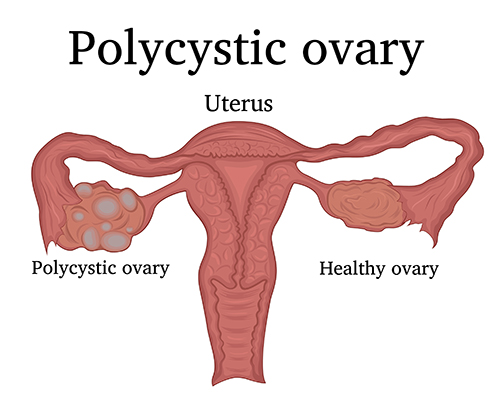Weight gain, acne, menstrual changes: Is it PCOS?
December 11, 2018

Women struggling with weight gain, acne, excessive hairiness, menstrual problems and other symptoms might be suffering from more than just annoying health problems. It could be a hormonal disorder known as PCOS. Victoria Ryvkin, M.D. an endocrinologist who specializes in issues related to the hormone system including thyroid, adrenal and pituitary problems, diabetes, menopause and related women’s health conditions, explains.
What is PCOS?
PCOS stands for polycystic ovarian syndrome. It is a combination of symptoms which may include abnormal menstrual cycles and/or failure to ovulate, excessive body or facial hair, acne, hair loss from the scalp, obesity (especially excess fat in the abdominal area), an apple body shape, insulin resistance or diabetes and problems with fertility. (An ultrasound can show multiple cysts on the ovaries.)

How would a woman know she might have it?
Most women will start having symptoms in their late teens to early 20s and most will see a new-onset irregularity in their menstrual cycle along with some of those skin and hair symptoms and weight gain. It is completely normal for reproductive-age women to have ovarian cysts, and their presence is not alone diagnostic of this syndrome.
How is it diagnosed?
It requires evidence of anovulation, which is failure to release a follicle during the menstrual cycle, as well as clinical and/or biochemical signs of excess “male” hormone levels, known as androgens. Cysts are not required for diagnosis. Additionally, it is vital to test for and exclude diseases with similar symptoms but which would have a different treatment plan.
Is it treatable?
There is no treatment, but we focus on addressing individual symptoms. For example, women suffering body hair or acne symptoms are offered a birth control pill in combination with a testosterone blocker. Women with elevated blood sugar or diabetes would be given medications to lower their sugar. Women unable to conceive will be treated for infertility. All women would be counseled on lifestyle to maintain a healthy body weight.
How often do PCOS patients need to be seen?
One to four times a year would be typical.
Does it affect fertility?
A sizable proportion of women with PCOS have a diminished capacity to conceive naturally. Treatment may range from simple oral medications taken daily all the way to in-vitro fertilization. Some women with PCOS have no trouble with fertility.
Is there an impact on menstrual cycles?
It can affect the frequency of cycles. They may come unpredictably or not at all. It usually does not affect the heaviness of the cycle or the severity of cramping.
How are the organs affected?
It affects adipose tissue (fat) which is a very active hormonal organ. It affects how our bodies make insulin in the pancreas and how our tissues (liver, muscles, fat) respond to insulin. It affects our brain, reproductive organs and possibly the cardiovascular system.
Is it a lifelong condition?
PCOS does not go away but symptoms may ease after menopause. Given our poor understanding of the disorder, however, there may be aftereffects that persist beyond menopause beyond the classic cosmetic issues and menstrual irregularities.
What causes it?
It’s likely genetic, as PCOS tends to run in families. There is no genetic test that can confirm the diagnosis or predict its transmission to offspring. Members of the same family might not necessarily all have the exact same symptoms.
Is it preventable?
No.
Is it contagious, and how might it affect my partner?
It is not a transmittable disease.
To make an appointment with Dr. Ryvkin, call her Mt. Prospect office at 847-725-8401, her Buffalo Grove office at 847-725-8401 or request an appointment online.